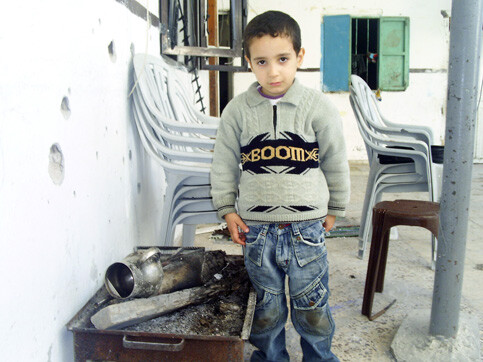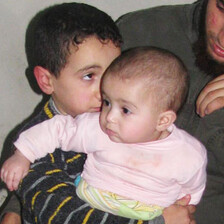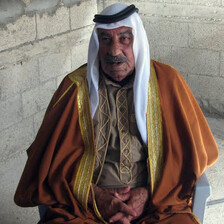Gaza Strip 12 January 2009

Jihad Abu Jbarah in front of the wood stove his family were sitting around when they were killed by Israeli-fired missiles. (Rami Almeghari)
Only a tea cup, a broken chair and some spots of blood were left where a short time before five members of the the Abu Jbarah family had been sitting in al-Bureij refugee camp in the central Gaza Strip.
“It was 10pm on Monday, 4 January when my father and four brothers were sitting in the yard of this house,” said Ali, 27, son of Jihad Abu Jbarah who was killed along with two other sons. “They were burning a wood fire to warm up and make tea. This is the cup my father was drinking tea from.”
Last Monday, Israeli warplanes hit the Abu Jbarah family home, killing three family members and wounding two others including one severely. At that point, this was the only fatal attack on this central region of Gaza since the Israeli bombardment began on 27 December.
The modestly-built refugee camp house, where 18 people including 10 children lived, has been reduced to ruins. A neighbor’s house was badly damaged by the two missiles fired by an Israeli warplane.
“My brother Khaled was carrying his daughter towards her bed as the weather was getting cold and as soon as he turned his back the rockets hit the house,” Ali recalled. “His daughter was about to sleep as he fell down to the ground after he sustained two shrapnel into his back.”
Khaled was transferred for urgent medical care to a Saudi Arabian hospital, due to his critical condition, leaving behind him a son and a daughter.
Basel, 30, Usama, 21 and their 53-year-old paralyzed father, Jihad, were all killed as the missiles dismembered them, scattering body parts in different directions.
“My father went to paradise,” says Jihad, Basel’s young son, as he stands near the wood stove that his father, uncle and grandfather had been sitting around when they were killed.
Bassam al-Krunz, a resident of al-Bureij camp, recalled the two brothers: “They were my friends, even though I am linked with Fatah. These slain people were good and kind and never did any harm. I cannot imagine that my friends, killed by the Israelis, were Hamas operatives.” Basel and Usama were affiliated with Hamas, the party that won the legislative elections in 2006 and which Israel states is the target of its military campaign in Gaza.
Whether they were affiliated with Hamas or not, this attack is an example of how Israel fails to distinguish between civilian and military targets by attacking a home, and fails to distinguish between combatants and non-combatants — all the men were doing when they were attacked was having a cup of tea.
Since 27 December, relentless Israeli attacks by air, sea and land have targeted people inside their homes, schools, mosques, shops and streets.
Last weekend, Israeli tanks bombarded a United Nations-administered school where scores of civilians had sought refugee from Israeli bombing. At least 40 people, almost all women and children, were killed. Israel at first claimed that it was returning mortar fire that had come from the school, before changing its story and admitting that an “errant” shell had struck the facility.
With civilians accounting for the vast majority of the more than 900 dead (almost 300 of them children) and 4,000 injured according to Palestinian medical sources, international human rights organizations and UN officials have called for an immediate ceasefire and investigations into allegations of Israeli war crimes.
Despite that, every day brings new tragedies. On 12 January, for example, Israeli shells hit a market in Gaza City’s Palestine Square market, killing two people and injuring a dozen others.
Rami Almeghari is contributor to The Electronic Intifada, IMEMC.org and Free Speech Radio News and is a part-time lecturer on media and political translation at the Islamic University of Gaza. Rami is also a former senior English translator at and editor-in-chief of the international press center of the Gaza-based Palestinian Information Service. He can be contacted at rami_almeghari A T hotmail D O T com.
Related Links





